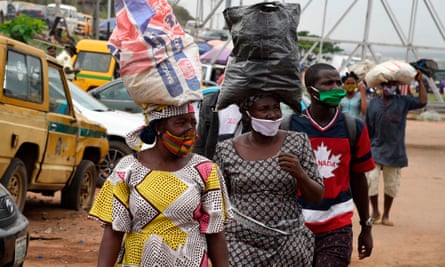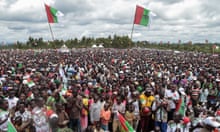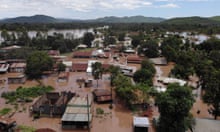More than 43 million people in west Africa are likely to be in urgent need of food assistance in the coming months – double the initial estimates – as the Covid-19 outbreak accelerates, the World Food Programme has said.
Food insecurity could also double this year to affect 265 million people across the continent; west Africa, where the outbreak of the virus is most severe, is of increasing concern.
The region faces the three-pronged threat of surging jihadi attacks across the Sahel and Lake Chad area, climate change harming vital food supply chains, and now the pandemic.
The WFP had estimated a 70% rise in food insecurity to 21 million people in west Africa this year before the outbreak, but now anticipates a further 22 million becoming reliant on food aid by August, unless major steps are taken.
“Even before Covid we had a number of shocks which were affecting people,” said Dr Chris Nikoi, the WFP’s regional director for west and central Africa.
“Food flows were already not optimal because of conflict across west Africa,” he said. Covid has exacerbated existing crises, presenting an immense challenge to food insecurity.
With schools closed in most African countries due to containment measures, the World Health Organization also estimates that 65 million children are now having to do without a previously provided nutritious meal at school.
Across the continent there have been more than 75,000 confirmed infections and 2,563 deaths.
According to the WHO, cases in Africa have not been as high as in other parts of the world, in part due to early and aggressive measures adopted by African countries to stem the spread.

Yet infections have risen more sharply in the past week, and are already a significant challenge to health systems.
The challenges are increasingly acute in a number of countries. After hundreds of deaths were linked to Covid-19 in the northern Nigerian state of Kano, similar reports proliferated elsewhere in the country, and health authorities are investigating outbreaks in seven other states.
A combination of the deaths and low levels of testing has cast doubt on the capacity of health authorities to detect cases across the country.
In Guinea-Bissau, a rise to 900 from 54 confirmed cases two weeks ago has left health services in the tiny west African country under strain, according to Médecins Sans Frontières.
“In a small country like Guinea-Bissau … this dramatic increase shows that the virus continues to spread in communities and faster than we thought,” said Monica Negrete, MSF’s head of mission in the country.
Unprecedented conflict in west Africa’s Sahel and the north-east of Nigeria has displaced millions in recent months, adding to the challenge of containing the virus in those countries.
About 4.5 million people are displaced in the Sahelian region covering Mali, Niger, Mauritiana, Chad and Burkina Faso. Of these, 838,000 have fled violence in the last year alone in Burkina Faso. Some 1.8 million people are displaced in north-east Nigeria.
Measures to prevent the spread of the virus among displaced populations have been swiftly adopted, yet aid organisations say those measures have also increased hunger, as distributing support has become a greater challenge.
African countries quickly adopted a range of aggressive measures that helped mitigate the spread of the virus. Lockdowns and travels bans were imposed when cases were few, yet many countries across Africa have begun relaxing lockdown measures while cases continue to accelerate.
The economic pressures – particularly on the millions working in informal economies, earning daily wages – have diminished the capacity for governments to lock down cities without rapidly impoverishing large populations.
“Governments are having to put in place certain measures, lockdowns, restricted movements etc, which are making an already bad situation in some areas, in some contexts, worse,” Nikoi said.
A competitive global market for test kits, favouring higher prices and bulk purchases, significantly disadvantaged many African countries, the ACDC has said. Yet the level of testing is gradually improving. About 1.2 million tests have now been administered, tripling in the last month, according to ADCD’s director, Dr John Nkengasong,
“We still have an issue of access to tests but the issue is going in the right direction,” he said.
The ACDC and WHO are supporting Senegal, Morocco, Kenya and South Africa in creating locally made diagnostic tests, which are expected to be validated in the next few weeks.








